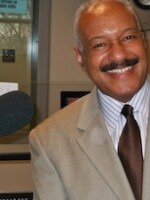“I’ve done as much as I could on drums…I’m moving on now.” That’s the way Grady Tate describes his music pursuits these days.
Tate's rich and soulful baritone voice is on display in live performances as well as on over five albums as a vocal leader. He established himself as a session drummer recording over 110 albums with various artist of multiple genre’s including classics on the CTI (Creed Taylor Inc.) label with Wes Montgomery, recordings with organist Jimmy Smith, Quincy Jones, Roland Kirk, Charles Mingus, Roy Ayers, Lou Donaldson, Freddie Hubbard, Peggy Lee, Bette Midler and so many more.
Tate was born on January 4, 1932, in Hayti, Durham North Carolina. He started singing in his church at 12 years old, where he was very popular until his voice began to change. Then, as a self-taught drummer he honed his percussion skills while in the air force (1951-1955). After discharge and after finishing college in Durham, Tate moved to Washington DC in 1959 to teach high school. During that time, he played drums with organist Wild Bill Davis.
Tate moved to New York and immediately got a gig with the Quincy Jones big band. Making his rounds as a session drummer, he worked with Ella Fitzgerald, Tony Bennett, Stan Getz, Count Basie, Duke Ellington, and the “Tonight Show” with Johnny Carson, among countless others. It was his tour with vocalist Peggy Lee that brought his vocal skills back to the forefront. Peggy Lee recognized his singing and incorporated Tate as a vocalist into her act. He performed duets with Lee on such tunes as her hit tune “Fever." In his own words, Tate describes what it was like working with singers such as Peggy Lee:
“Peggy was just sultry, not nasty or rowdy. I enjoyed playing with her. I guess I've tried to do some of that with my singing. One of the reasons I've played with so many singers was to see and learn what they were doing. You have to listen to all of the people who are successful at it. Find those that do it to the most of what you like. Key in on that person, not to sound exactly like them, but to get the essence of their feeling. Like Peggy Lee, she'd go [Tate imitates her understated, bluesy style] and I'd think: Where did she get that from? She was soulful.”
Many drummers have asked how it is possible to play so well in so many different genres and musical configurations. When Tate was asked a similar question by interviewer Greg Thomas, he responded:
“Basically, I studied by listening. I didn't just hear the lead instrumentalists, I heard their drummers, and I heard how they played with each group of people. The better the drummer was, the better that time-keeper was, with all of the fluctuations and complex things they did, it was still swinging. It didn't allow you to get away from that swing. And I thought about that. So that's where I went. I can tell you right off the bat—I'm not original at anything. Drummers today who say they're an original, they're liars. There are too many cats that could play extremely well, and none of them had all of it. So you pick stuff out that fits you most. Next thing you know I was playing it.”
Having experienced that special Tate drum sound on so many great classic recordings, including Quincy Jones “Killer Joe” (the album “Walking in Space”), it all begs the question…Tate, now that you are concentrating on vocals, do you ever miss playing drums?
“Yes, I miss playing the drums. I don't miss the traveling with them. They were really very difficult to handle. You want them in tip-top shape. All of us drummers, we took care of our instruments. I just wanted to try something else that I happen to have been doing all of my life, to see if I could get to the same level of singing as the drums I was playing. “
Tate has been nominated for several Grammys, and has been nominated for “Best Jazz Vocalist” for his rendition of Michael Jackson's “She’s Out Of My Life.” Tate currently lives in Washington DC and serves on the faculty at the prestigious Howard University.








